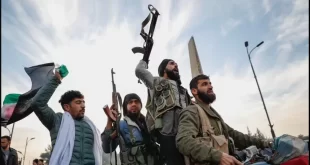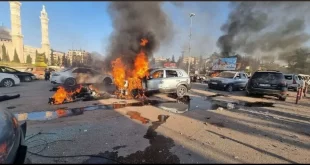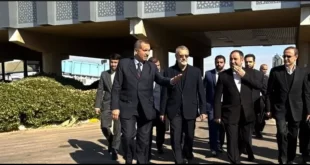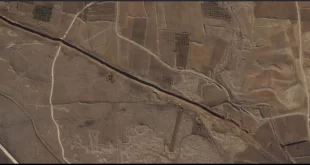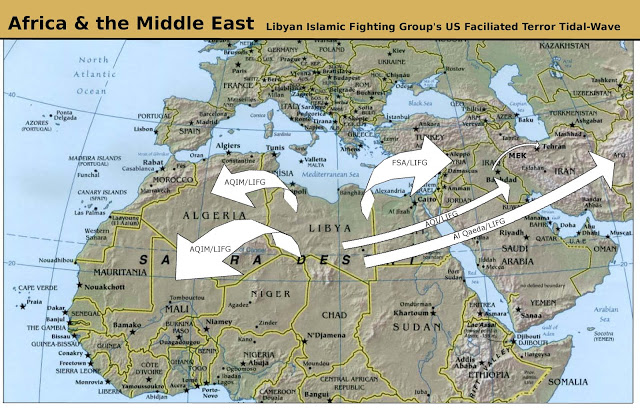
NATO’s North African terror tidal wave predictably sweeps into Kenya
Sep 23, 2013, Tony Cartalucci
At face value, and how the Western media is attempting to portray it, the Westgate Mall siege in Kenya’s capital city of Nairobi appears to be yet another senseless terrorist attack by the “religious fanatics” of Al Qaeda’s Somalia franchise, Al Shabaab. Already, both Kenyan and Western politicians, as well as editorials across the Western media, are attempting to use the attack as a pretext to launch a military campaign against neighboring Somalia, while fueling anti-Muslim sentiment across profoundly ignorant audiences in the West.
A telling op-ed in USA Today titled, “Nairobi mall attack strikes against all of us: Column” states in its subtitle that:
As on 9/11, terrorists are waging a war on our modern, democratic way of life. Today, we are all Kenyans.
The op-ed continues by stating:
Just as important: The fight is not just a Kenyan, or African, fight. Somalia could be the new Afghanistan. A lawless, fundamentalist Somalia could incubate a Somali Osama bin Laden and new attacks on the USA, just as Afghanistan protected and nurtured bin Laden and al-Qaeda.
And:
After the Nairobi attack, the message should be “We Are All Kenyans.” Not just in our sympathy. But also in going all out to prevent another terrorist attack.
Leaving Somalia to al-Shabab is not an option.
Kenya: Proxy for US Aggression in Africa
What the USA Today op-ed fails to mention, even as it alludes to impending military intervention in Somalia, is that Kenya has already participated in military operations against its northern neighbor, including a full-scale military invasion complete with US and French military support in 2011. In the UK Independent’s October 2011 article, “Somali invasion backed by West, says Kenya,” it was reported that:
Kenya has confirmed that Western allies have joined its war on Islamic militants al-Shabaab despite denials from the US and France that they are involved in fighting in southern Somalia. Foreign military forces have carried out air strikes and a naval bombardment close to the militant stronghold of Kismayo, a Kenyan army spokesman said yesterday.
“There are certainly other actors in this theatre carrying out other attacks,” said Kenya’s Major Emmanuel Chirchir.
The Kenyan invasion has already caused a major rift between Somalia’s interim prime minister and president, who yesterday condemned the presence of foreign troops inside his country.
The US military, which has a base in neighbouring Djibouti, has previously carried out drone strikes in Somalia.
It has also launched air strikes against alleged al-Qaeda militants in the country.
Before using Kenya as a proxy for US aggression in Africa, and amidst two decades of unilateral, covert military operations, the US had backed two Ethiopian invasions into Somalia. The first US-backed invasion, under then US President George Bush, was carried out in 2006. USA Today reported in its 2007 article, “U.S. support key to Ethiopia’s invasion,” that:
The United States has quietly poured weapons and military advisers into Ethiopia, whose recent invasion of Somalia opened a new front in the Bush administration’s war on terrorism.
The second US-backed Ethiopian invasion of Somalia, under US President Barack Obama, was carried out in 2011 – coordinated with Kenya’s 2011 US-French-backed extraterritorial adventure into Somali territory. The UK Independent’s December 2011 article, “UN-backed invasion of Somalia spirals into chaos,” reported that:
Kenya’s invasion of Somalia, hailed by the West and the UN Security Council, was meant to deliver a knockout blow to the militant Islamist group al-Shabaab. Instead it has pulled Somalia’s regional rival Ethiopia back into the country, stirred up the warlords and rekindled popular support for fundamentalists whose willingness to let Somalis starve rather than receive foreign aid had left them widely hated.
It was in fact this US-backed military invasion that served as the alleged motivation of the Al Shabaab terrorists who attacked Kenya’s Westgate Mall this week.
The Same Terrorists the US is Arming in Syria are Killing Civilians in Kenya
Beginning in 2011, geopolitical analysts warned that US, British and French intervention in Libya would create a terror emirate that would unleash a tidal wave of militant destabilization across Northern Africa and beyond. From Mali to Kenya, and as far as Syria, violence directly linked to the militants and the aid and weapons they received from the West in Libya, have now been felt.
Shortly after NATO’s intervention in Libya, it was Al Qaeda in the Islamic Maghreb (AQIM), a US State Department listed terror organization (listed #38), that played a central role in the invasion of northern Mali, which provided the pretext for French military intervention and occupation. AQIM of course, was merged with Al Qaeda’s Libyan Islamic Fighting Group (LIFG), the ground troops used in NATO’s regime change operation in Libya starting in 2011. In a 2007 West Point Combating Terrorism Center (CTC) report and a 2011 CTC report, “Are Islamist Extremists Fighting Among Libya’s Rebels?,” AQIM is specifically mentioned as working closely with the Libyan Islamic Fighting Group (LIFG). The latter report admits:
There have also been reports during the past few years of a handful of Libyans who have traveled to Algeria to train with al-Qa`ida in the Islamic Maghreb (AQIM), although these reports are unconfirmed. AQIM has sought to capitalize on the situation in Libya
Geopolitical analyst Pepe Escobar would elaborate in an Asia Times piece titled, “How al-Qaeda got to rule in Tripoli,” that:
“Crucially, still in 2007, then al-Qaeda’s number two, Zawahiri, officially announced the merger between the LIFG and al-Qaeda in the Islamic Mahgreb (AQIM). So, for all practical purposes, since then, LIFG/AQIM have been one and the same – and Belhaj was/is its emir. “
“Belhaj,” referring to Hakim Abdul Belhaj, leader of LIFG in Libya, led with NATO support, arms, funding, and diplomatic recognition, the overthrowing of Muammar Qaddafi and has now plunged the nation into racist genocidal infighting. This intervention has also seen the rebellion’s epicenter of Benghazi peeling off from Tripolias a semi-autonomous “Terror-Emirate.” Belhaj’s latest campaign has shifted to Syria where he was admittedly on the Turkish-Syrian border pledging weapons, money, and fighters to the so-called “Free Syrian Army,” again, under the auspices of NATO support.
The torrent of militants and weapons flowing from Libya into Syria to support Western-backed regime change against the Syrian government has been extensively documented over the last 2+ years.
In November 2011, the Telegraph in their article, “Leading Libyan Islamist met Free Syrian Army opposition group,” would report:
Abdulhakim Belhadj, head of the Tripoli Military Council and the former leader of the Libyan Islamic Fighting Group, “met with Free Syrian Army leaders in Istanbul and on the border with Turkey,” said a military official working with Mr Belhadj. “Mustafa Abdul Jalil (the interim Libyan president) sent him there.”
Another Telegraph article, “Libya’s new rulers offer weapons to Syrian rebels,” would admit
Syrian rebels held secret talks with Libya’s new authorities on Friday, aiming to secure weapons and money for their insurgency against President Bashar al-Assad’s regime, The Daily Telegraph has learned.
At the meeting, which was held in Istanbul and included Turkish officials, the Syrians requested “assistance” from the Libyan representatives and were offered arms, and potentially volunteers.
“There is something being planned to send weapons and even Libyan fighters to Syria,” said a Libyan source, speaking on condition of anonymity. “There is a military intervention on the way. Within a few weeks you will see.”
Later that month, some 600 Libyan terrorists would be reported to have entered Syria to begin combat operations and as recently as last month, CNN, whose Ivan Watson accompanied terrorists over the Turkish-Syrian border and into Aleppo, revealed that indeed foreign fighters were amongst the militants, particularly Libyans. It was admitted that:
Meanwhile, residents of the village where the Syrian Falcons were headquartered said there were fighters of several North African nationalities also serving with the brigade’s ranks.
A volunteer Libyan fighter has also told CNN he intends to travel from Turkey to Syria within days to add a “platoon” of Libyan fighters to armed movement.
On Wednesday, CNN’s crew met a Libyan fighter who had crossed into Syria from Turkey with four other Libyans. The fighter wore full camouflage and was carrying a Kalashnikov rifle. He said more Libyan fighters were on the way.
The foreign fighters, some of them are clearly drawn because they see this as … a jihad. So this is a magnet for jihadists who see this as a fight for Sunni Muslims.
CNN’s reports provide bookends to 2011’s admissions that large numbers of Libyan terrorists flush with NATO cash and weapons had headed to Syria, with notorious terrorist LIFG commanders making the arrangements.
Three of Africa’s largest militant Islamist groups are trying to co-ordinate their efforts, the head of the US Africa Command has warned.
Gen Carter Ham said in particular North African al-Qaeda in the Islamic Maghreb (AQIM) was probably sharing explosives and funds with Nigeria’s Boko Haram.
Speaking in Washington, he said the separatist movement in northern Mali had provided AQIM with a “safe haven”.
Somalia’s al-Shabab was the other “most dangerous” group, he said.
This cooperation between AQIM, Boko Haram, and Al Shabaab has been clearly bolstered by the immense influx of NATO-provided cash and weapons flowing into Libya first to overthrow the Libyan government, then to be shipped to Syria to overthrow the government there. NATO’s assistance in expanding Al Qaeda’s operational capacity in North Africa can only be helping terrorists like those behind the Kenya Westgate Mall siege carry out cross-border operations of this scale.
Despite attempts by the West to provide other explanations as to where Al Qaeda is receiving its funds, manpower, and arsenal to carry out global campaigns, it is clear that it is a product of state-sponsorship – states like the US, UK, France, Saudi Arabia, Israel, Qatar, Turkey, Jordan, and others.
Indeed, Al Shabaab’s attack in Kenya is abhorrent, unjustifiable terrorism – however, what Kenyans and the world as a whole must remember, is who armed them, who continuously props them up, provides them entire nations (Libya) as safe havens, and swells their ranks and armories with billions in cash and thousands of tons of weaponry at a time in war zones like Syria.
Al Shabaab’s continued existence, along with its counterparts AQIM across Northern Africa, LIFG in Libya, Boko Haram in Nigeria, and Al Nusra in Syria, is due entirely to both covert and overt Western military and financial backing. The blood of Kenya’s innocent are on the hands of those within the Kenyan government willfully serving as a proxy for US aggression across Africa, and those across the West using Al Qaeda as a geopolitical tool to achieve their global objectives.
The fact that more people are discuss twerking than Syria is not necessarily bad news. They share, as Floating Sheep notes, “little in common apart from recent media attention”: One is a pop culture phenomenon (both more fun and more accessible to a wider swath of the population) and one is a tragic, complicated news event halfway around the world (critically important, but not very fun — particularly on a platform many use for recreation).
Of course, even if you polled all 300 million Americans on their relative interest in twerking and Syria, twerking would probably win — and that’s okay, too. There are many justifiable reasons why an individual or a population wouldn’t care about foreign news — things like a lack of education and limited access to computers or newspapers.
The Nairobi shopping mall attack is heartbreaking. The stories could so easily be American stories.
 Syria Support Movement solidarity with the Syrian people
Syria Support Movement solidarity with the Syrian people

